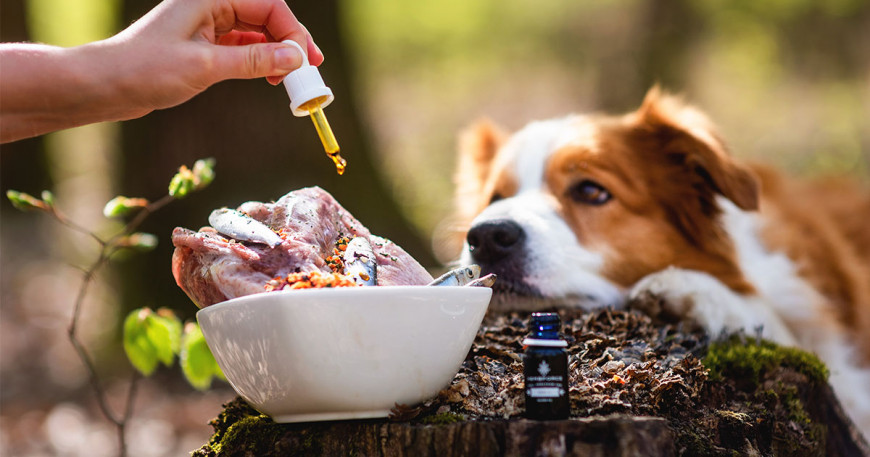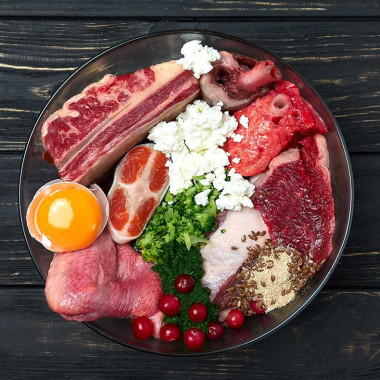Feeding a raw diet is subject to many misconceptions. One of them is the belief that a dog fed a homemade raw diet doesn't get the right balance of essential vitamins, minerals, and trace elements. This raises the question: are dietary supplements necessary when feeding a BARF diet? Opinions among breeders vary, but many claim that a varied diet is sufficient.
Compared to dry food, where each portion is essentially the same, raw feeding is indeed diverse. BARF feeding is not about every meal being perfectly balanced. The goal is to achieve nutritional balance over days or weeks. Even we humans don't consume the exact required nutrients every day. The key is to focus on variety, with a few exceptions where supplements are needed.
Supplements can be beneficial and necessary depending on the dog's age, health status, and condition. The most common supplements include nuts and seeds, oils, mineral supplements, joint supplements, and herbs.
Nuts and Seeds
Various types of nuts and seeds can serve as a pleasant addition to the diet. They are rich in fats and trace elements, although they cannot meet the total trace element requirements the body needs. Nuts and seeds provide a highly bioavailable form of calcium, even more than milk, because the calcium in milk is bound to casein, making it less usable. For puppies that cannot yet consume bones, adding seeds and nuts to their diet can be an excellent source of calcium. However, remember that seeds are very small, so they should be mechanically processed to maximize absorption. Be mindful of the risk of inhalation, so it is better to crush or cook the seeds for safety.
Flaxseed is an excellent source of unsaturated fatty acids, while sesame seeds are rich in quality proteins, essential fatty acids, minerals, trace elements, and even fiber. Pumpkin and sunflower seeds also offer a rich source of minerals and vitamins. Poppy seeds are high in calcium, which is especially useful for puppies and growing dogs. Another popular supplement is alfalfa (Medicago sativa), which contains a high percentage of proteins, essential fatty acids, vitamins, and minerals. Nuts like walnuts, hazelnuts, Brazil nuts, and almonds are also suitable for fat supplementation.
Oils
Not everyone considers oils a supplement; they are often viewed as an essential component of the diet. Oils provide essential fatty acids that the body can only obtain through food, along with vitamins, trace elements, and minerals. Oils can be of animal or plant origin. It's advisable to alternate between oils, but even using just one is better than none. Among the most popular animal oils are fish oils, which are natural sources of vitamins A, D, and Omega-3 fatty acids. Fish oils include herring, sardine, salmon, cod liver oil, and whale fats. Due to the high vitamin content, it's important to stick to the recommended dosage to avoid overdosing. Plant oils are more diverse and are often used for external treatments of coat and skin. The most commonly used plant oils include sunflower, olive, pumpkin, flax, borage, and poppy seed oils.
Mineral Supplements
Mineral substances required by the body can be divided into macro-elements and micro-elements. This division refers to their concentration in the body. Macro-elements like calcium, phosphorus, sodium, potassium, magnesium, chlorine, and sulfur are present in larger quantities in the body. Micro-elements, also called trace elements, are found in much smaller amounts and include iron, copper, zinc, manganese, iodine, selenium, cobalt, chromium, boron, and others. Mineral elements serve various important functions, making them extremely important. Many products are available on the market to supplement these minerals with different content spectrums. However, it is also possible to enrich the diet with natural products like seaweed, chlorella, spirulina, yeast, vitamin C, and calcium.
Joint Supplements
When supporting joints and bones, it is important to clarify the purpose of the supplements. Since there are many products on the market with varying effects, it's important to know whether the supplement is for prevention or treatment. Joint supplements can be beneficial during growth periods, during increased physical activity, or in cases of illness where pain-relieving substances are often included, which may not be necessary for a healthy dog. Joint supplements are especially welcome for growing dogs, particularly large and giant breeds, or for older dogs. Preventative joint support can be provided with hydrolyzed collagen in powder or liquid form. There are also many homemade recipes, such as gelatin made from pork skins or trotters.
Herbs
Nowadays, herbs are quite popular and are added not only to raw diets but also to conventional commercial foods (kibble and canned food for dogs). Herbs don't play as significant a role in a dog's diet as they do for humans. Many plants can have a more medicinal rather than nutritional effect. Unnecessary use of certain herbs can actually do more harm than good to your dog. It's important to ask yourself whether a particular herb is even necessary for your dog at that moment. Some herbs, like basil or parsley, are safe for everyday use.
Nutritional supplements should not be underestimated but also not overestimated. The need for supplements varies with each stage of a dog's life.










